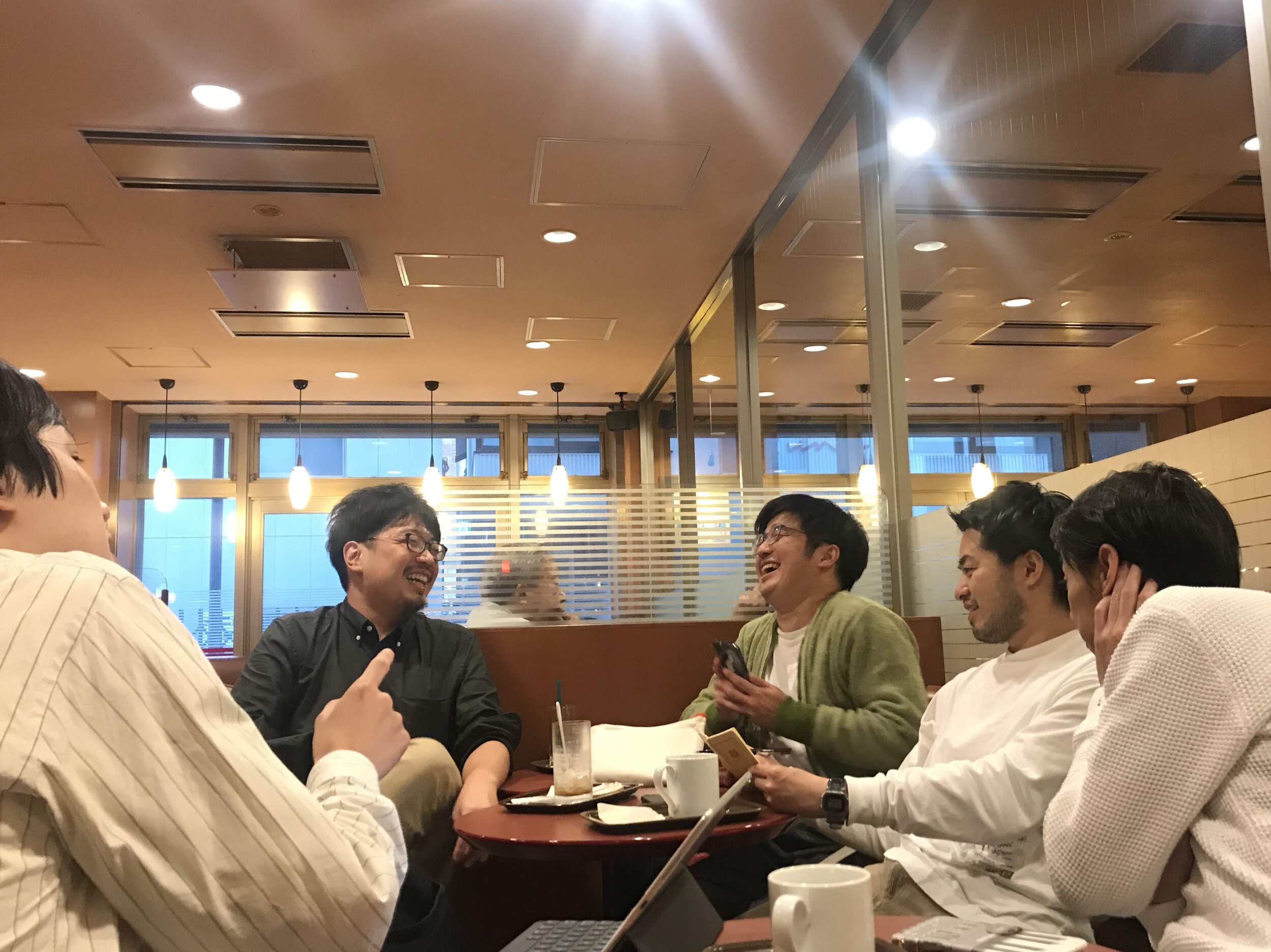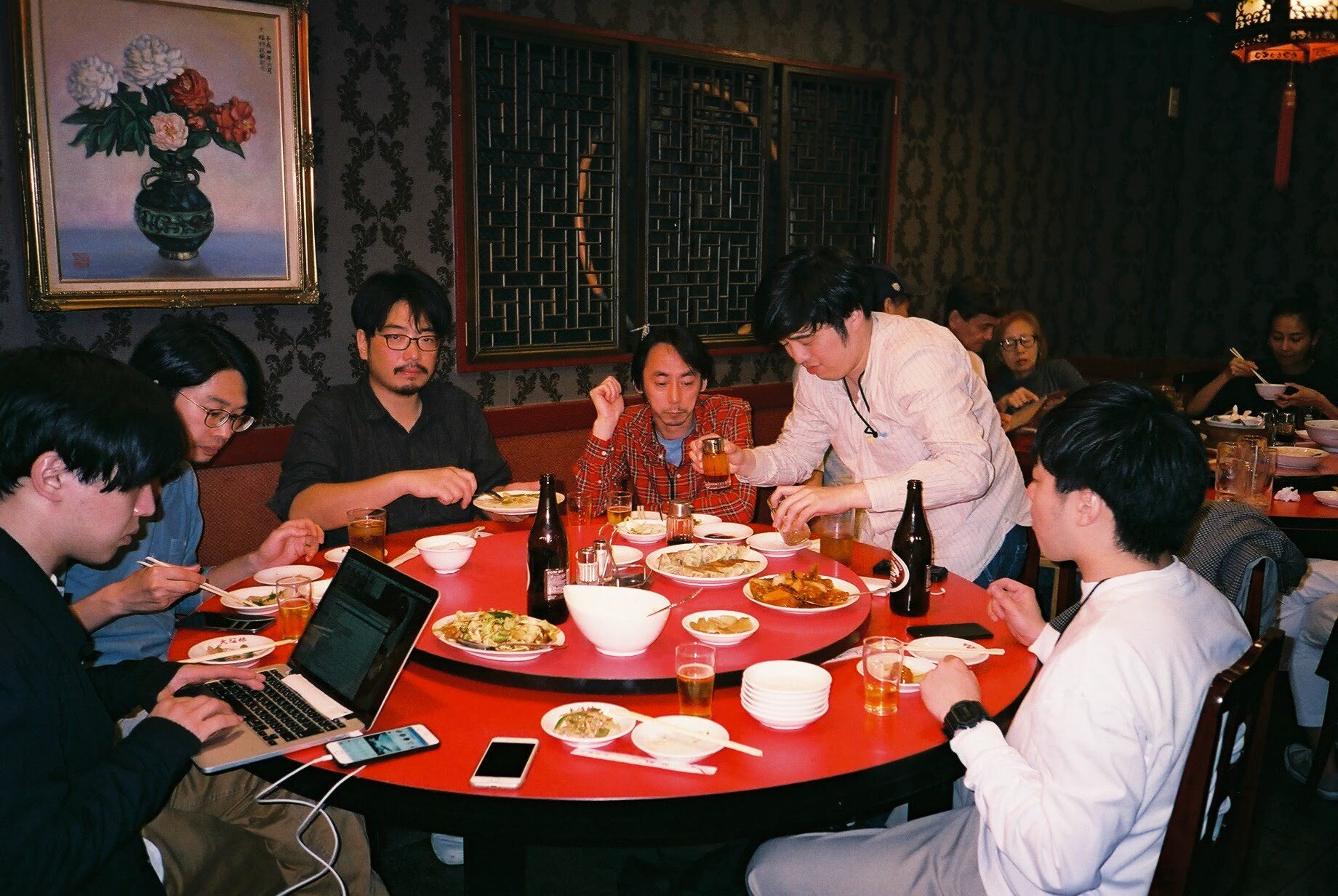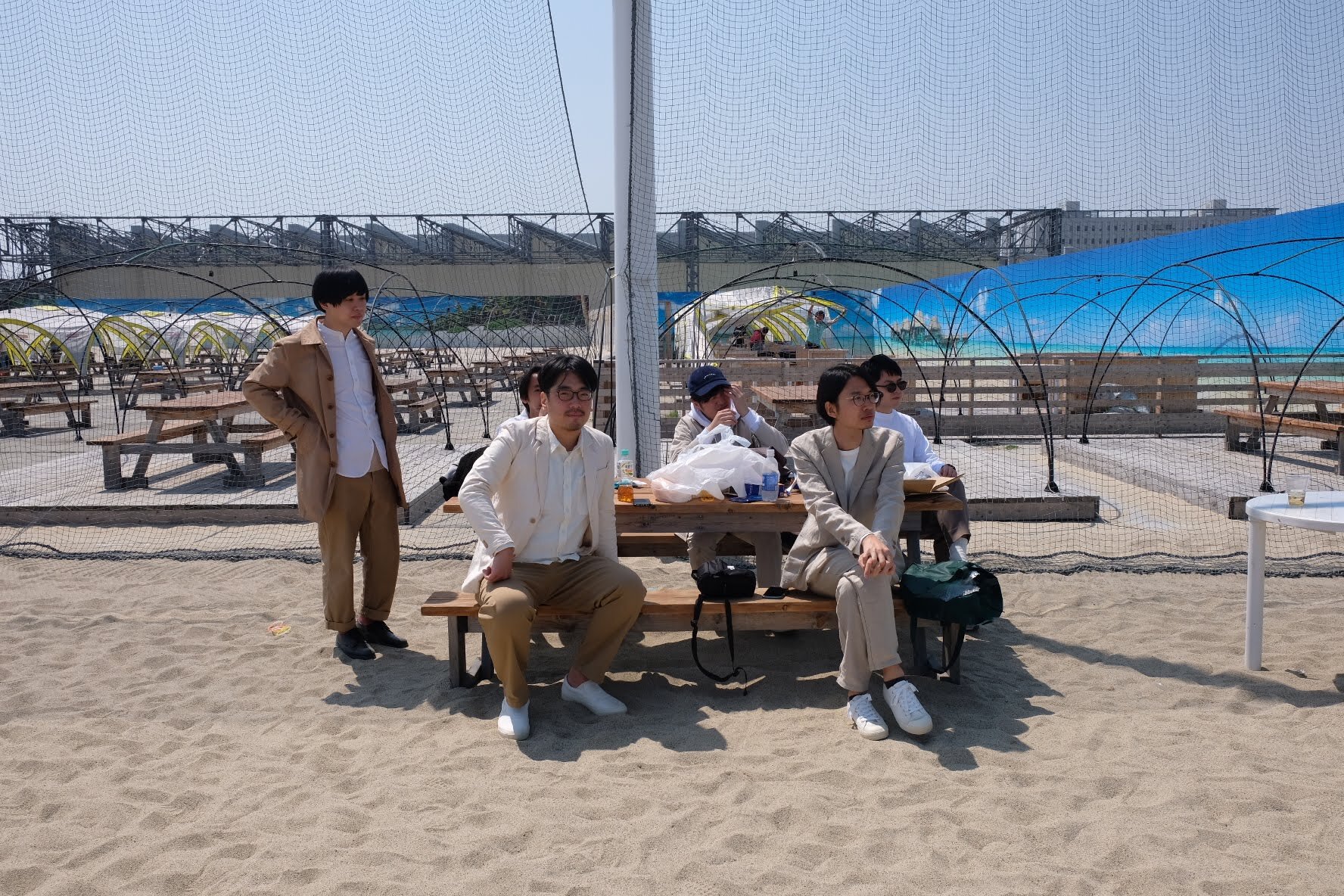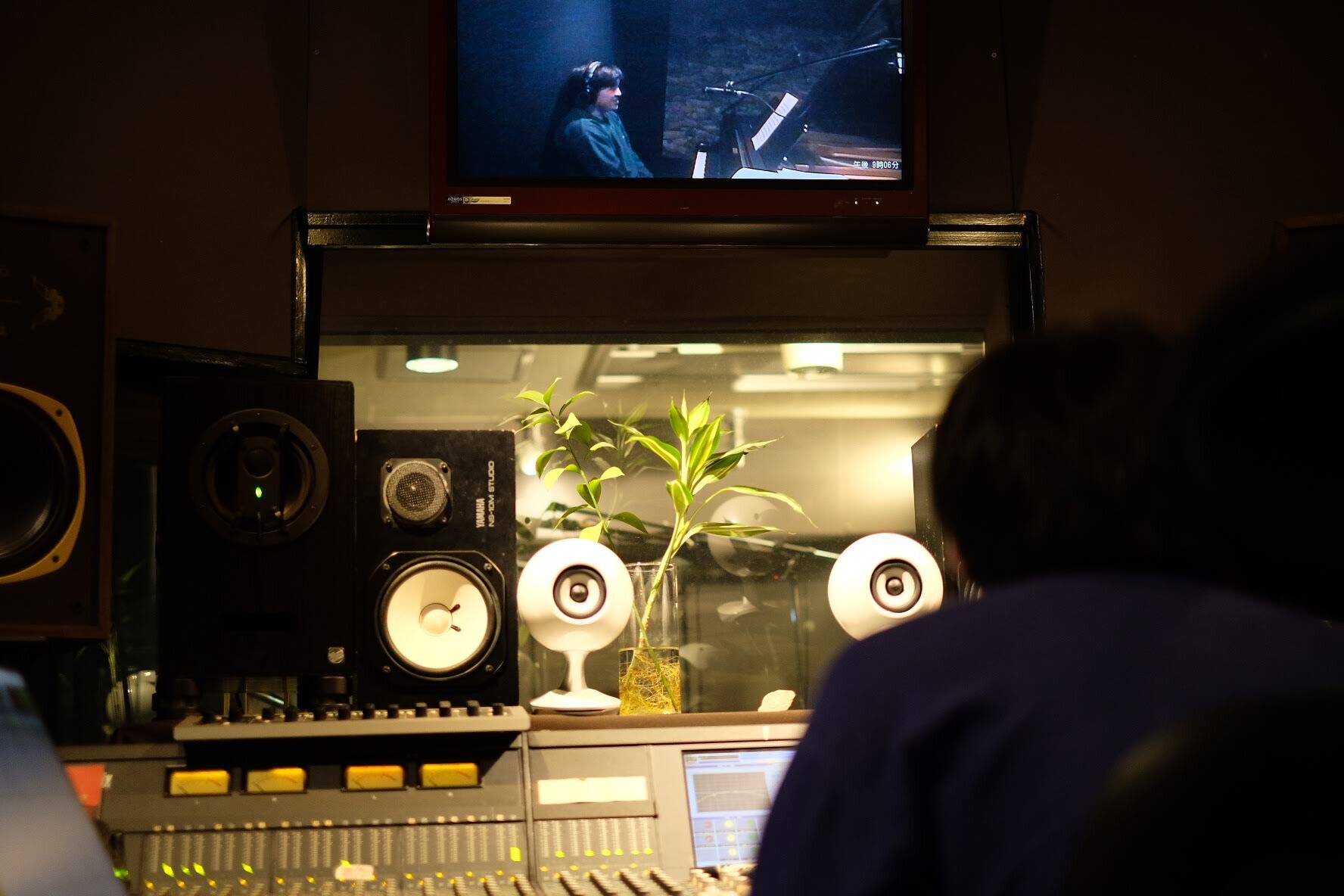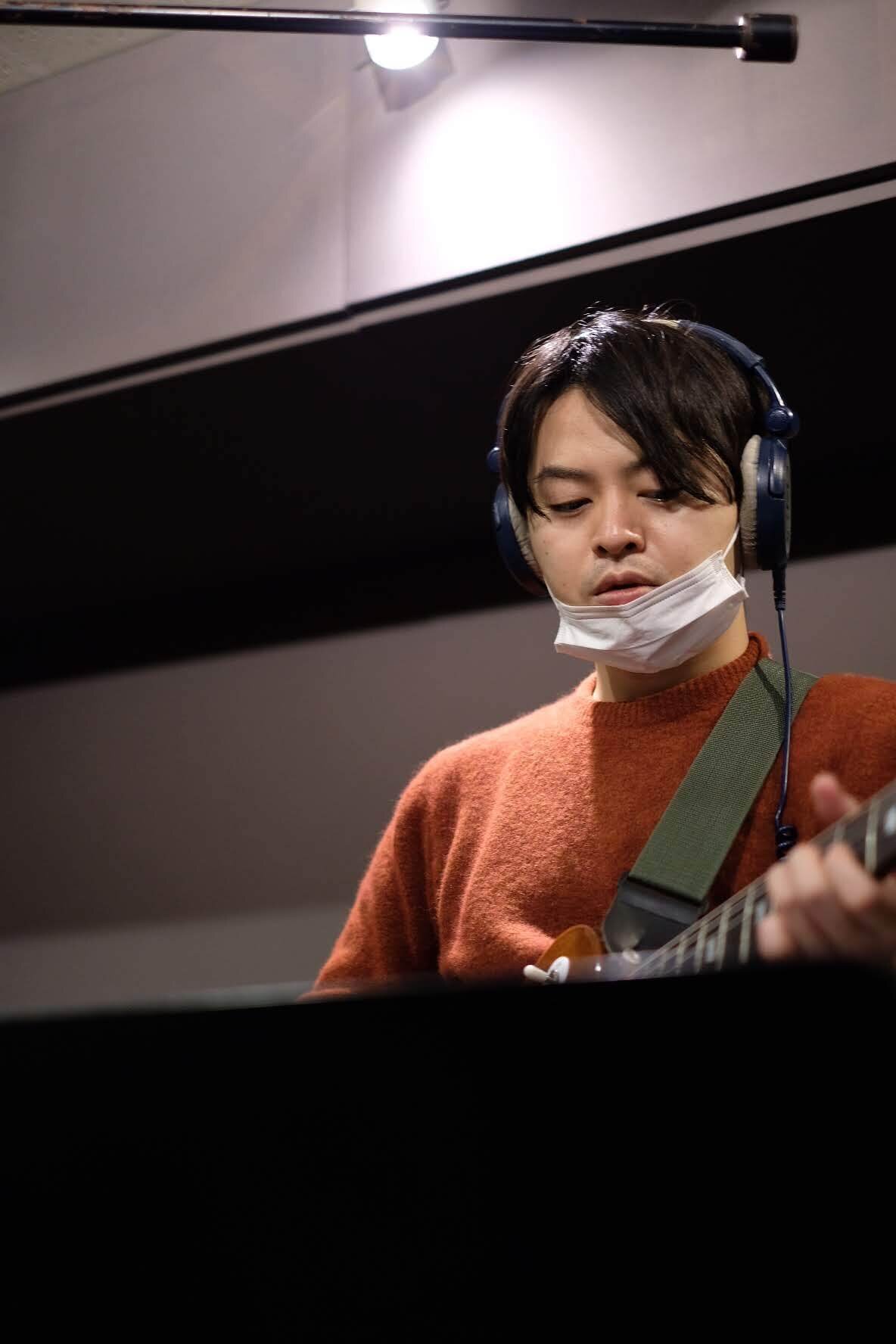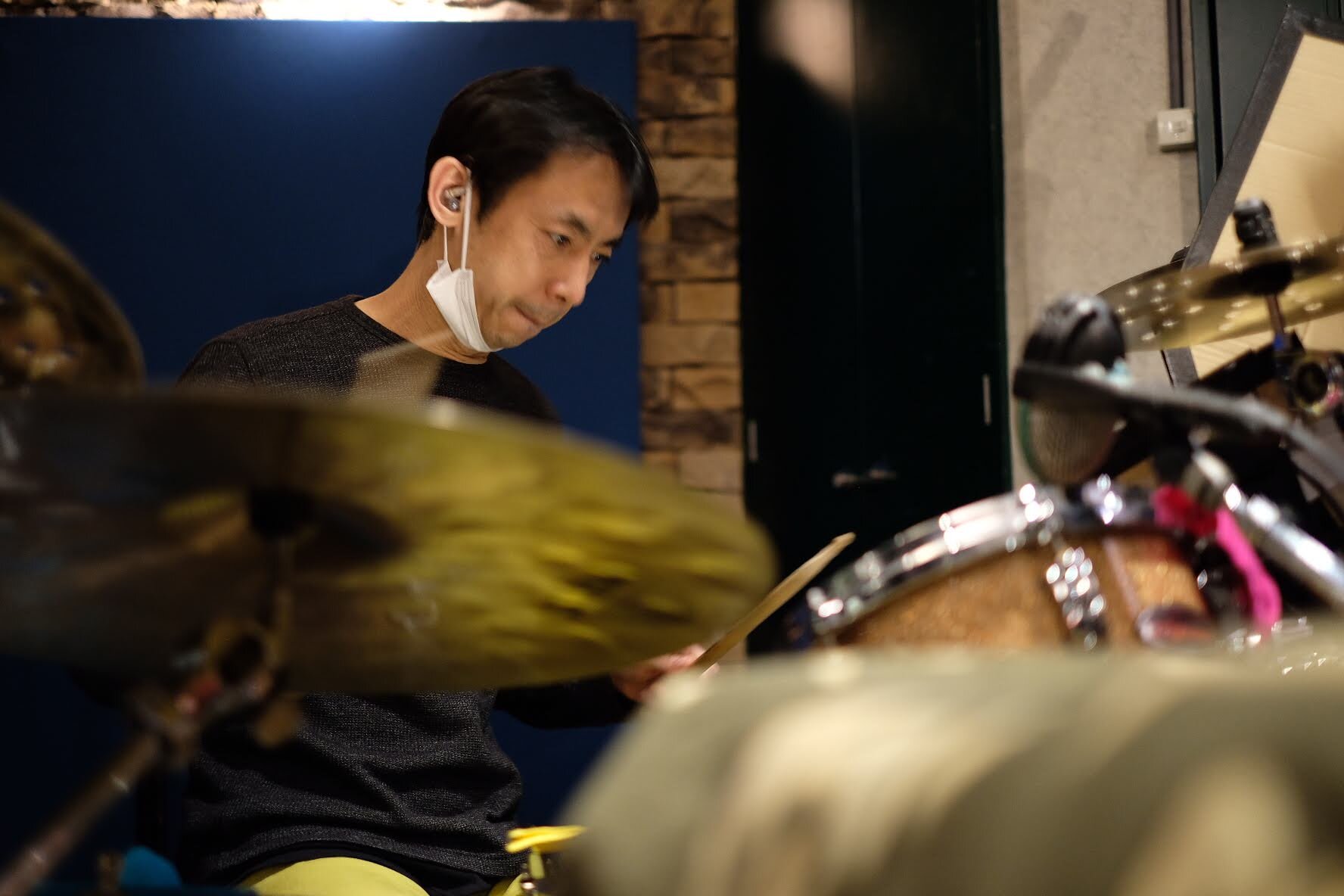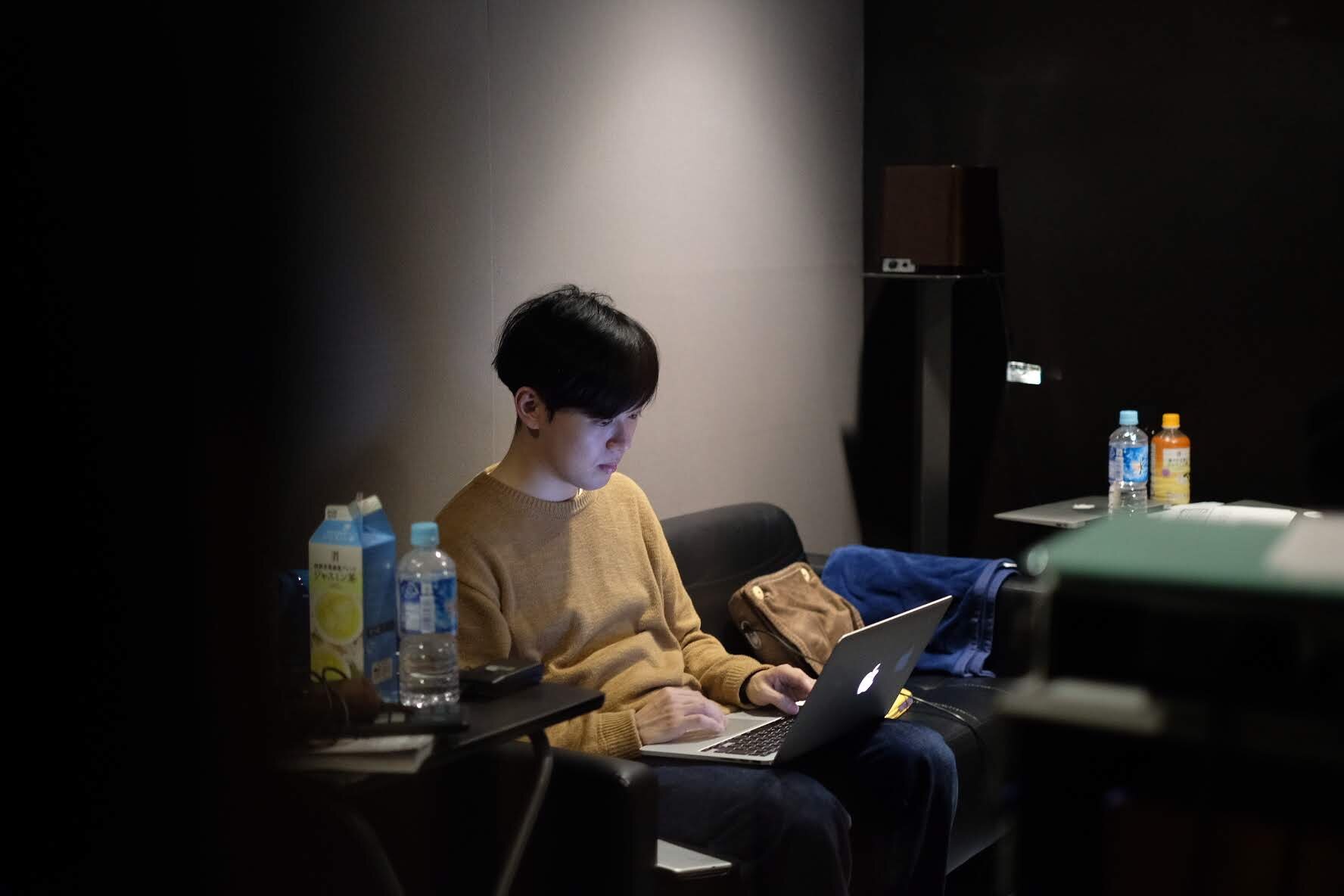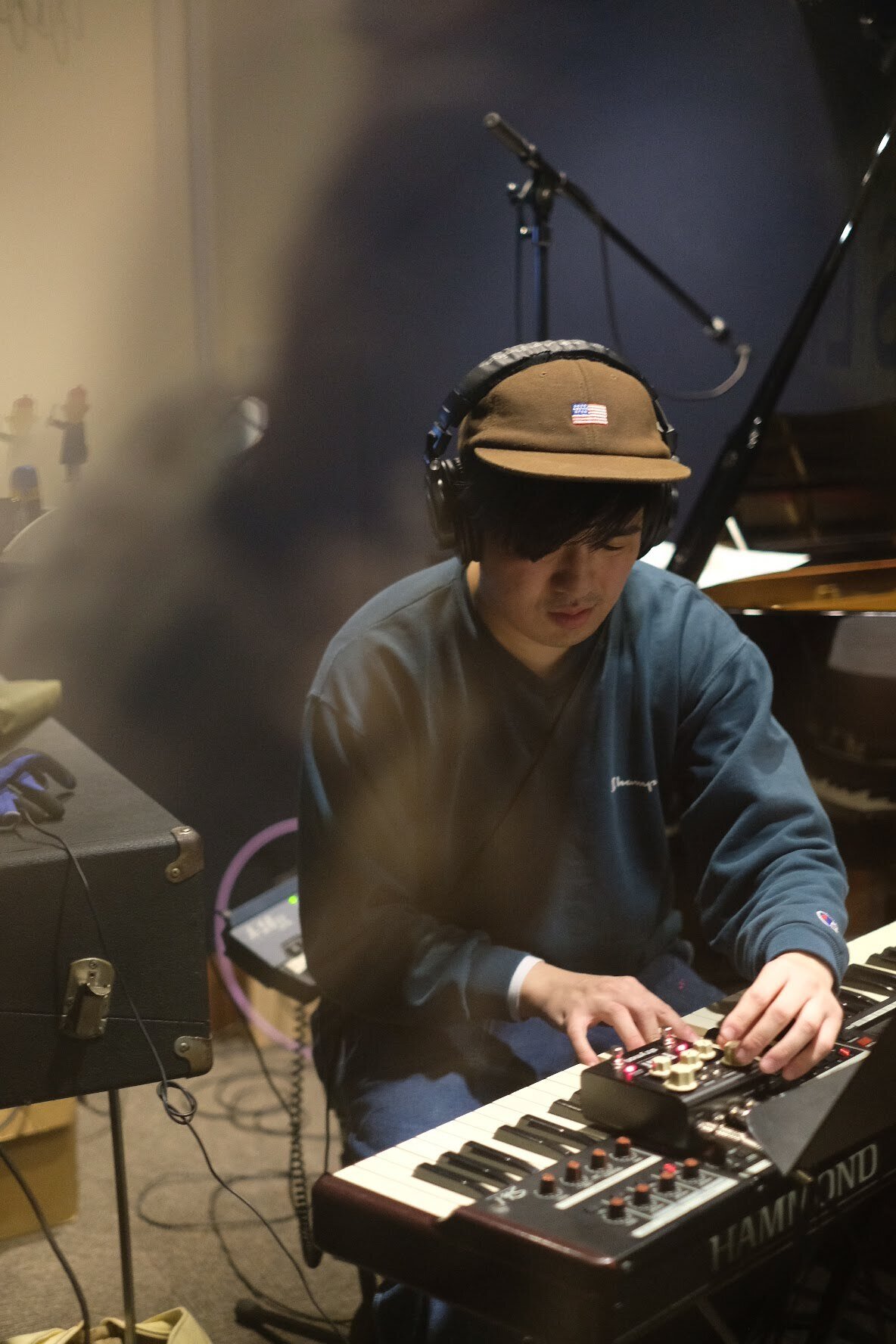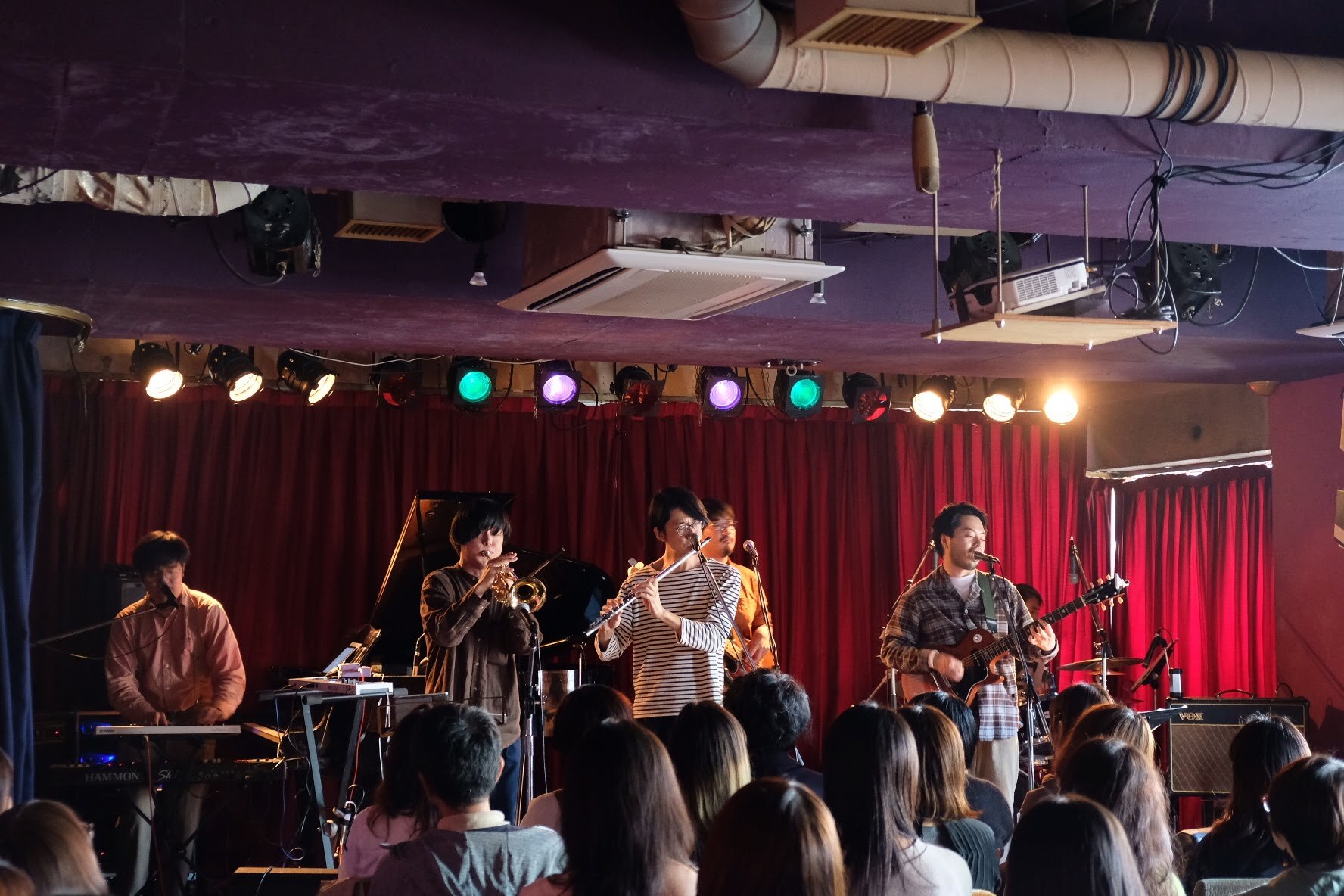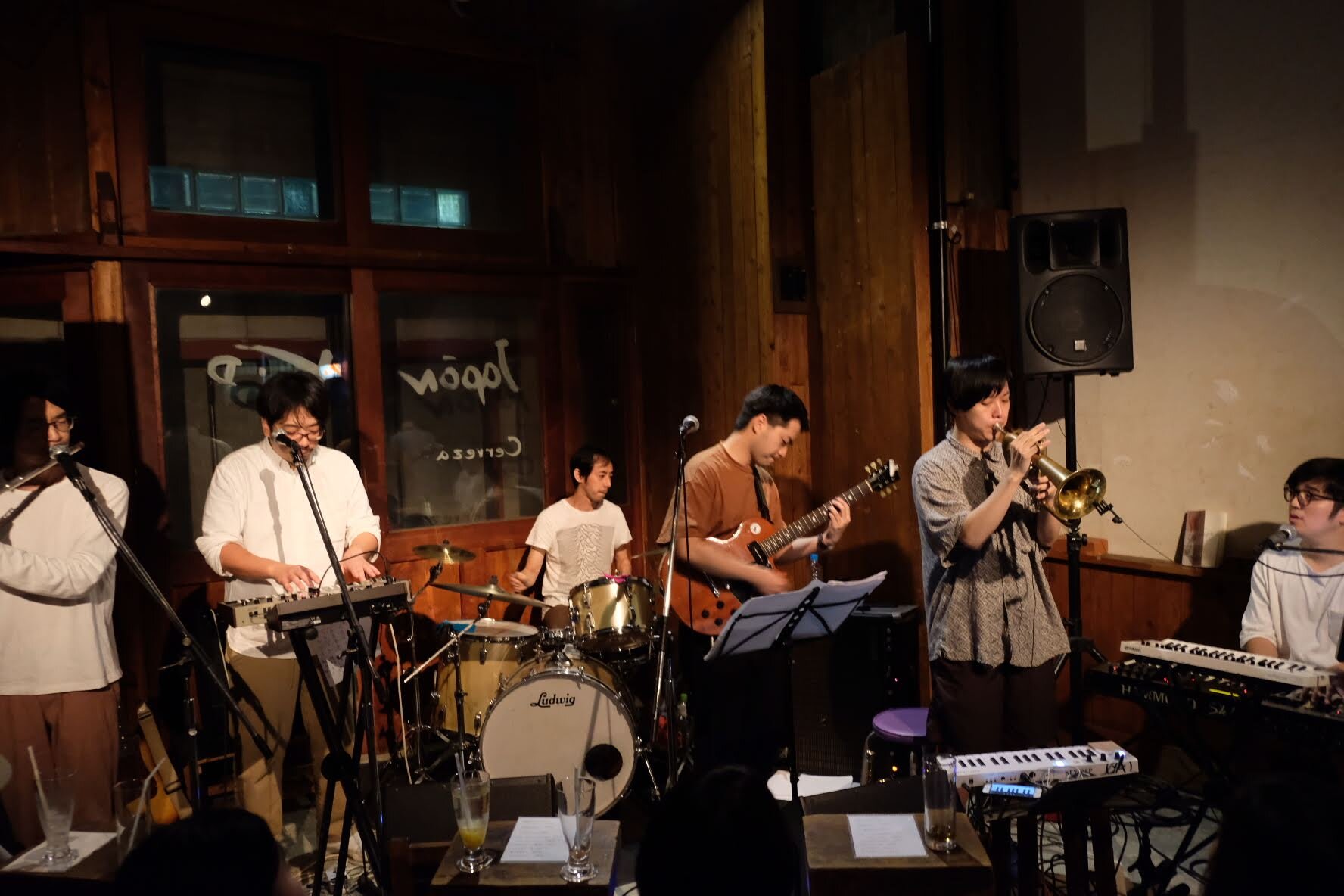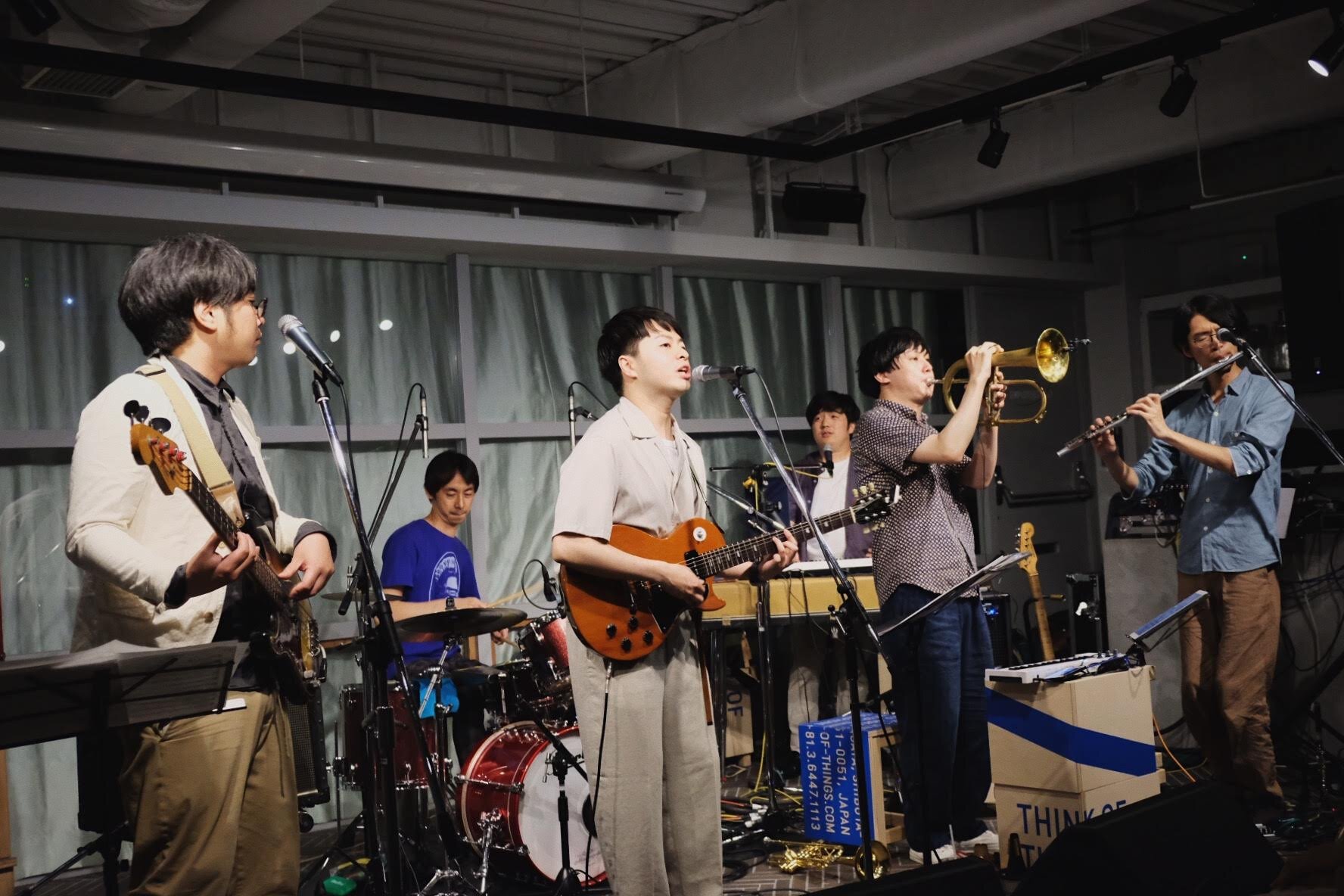Interview with 1983
1983 is a 6-piece ensemble based in Tokyo led by Yoshihito Shinma with their foundation in roots music but tastes stretching across electronica, AOR, bossa nova, jazz and big band for a complex, rich sound. Tokyo ON catches up with them following the release of their excellent 3rd album “渚にきこえて・Passes On the Other Ocean” and successful promotional tour.
Left to right: Taniguchi, Ito, Shinma, Seki, Matsumura, Takahashi
Photos by Fuyuno Yatsuzuka
<About 1983>
Tokyo ON: How was the band formed?
Shinma: 1983 was formed around October 2012 as a support act for the performance of a band called 魚座 (meaning Pisces) from Kyushu, Japan. I called up some musicians that I had always wanted to work and they became the band members. We couldn't make time to practice together, and although the concert was the first time we actually played as a group, I felt it all came together in the performance and so we decided to continue as a band.
TO: Being born in the 80’s, you would have grown up with things like Dreams Come True, Tetsuya Komuro production, video games, techno, hip-hop, synthpop and grunge. Yet 1983’s sound has its roots in the 70’s. What was your music/cultural environment like growing up?
Shinma: As you mentioned, we grew up listening to 90’s J-POP and bands like Radiohead, Tortoise, Nirvana, くるり, NUMBER GIRL, SUPERCAR, Hi-STANDARD, BRAHMAN, BACK DROP BOMB and so on. It's a very typical listening journey for our generation (circa 1983-4) Japanese college rock musicians.
I, Yoshihito Shimma; the leader of 1983, and Nobuhiro Seki; the main songwriter of the band, are friends from college days (around 2004-2008), and we have listened to and played a ton of American roots music or music influenced by it. For example, The Band, Bob Dylan, Gram Parsons/The Byrds, Fairport Convention, BORDERLINE, The Replacements, Meat Puppets, Uncle Tupelo, Son Volt, Happy End (including ex-members solo works), コモンビル and so on. But I approached it as as listener more than a researcher, I didn't decide to focus on this particular decade. At that time, we were completely unaware of what age the music was made.
TO: What personally draws you to that era and its sound?
Shinma: The above music is the roots music of Seki and I, so it can be said that it is our listening journey. As I say many times, we don't have a specific preference for the sound of the past. In the end, it may be more a matter of taste and aesthetics.
TO: Do you listen to modern music? Is there anything that inspires you from the present?
Shinma: Each of us has different tastes, but the genres we listen to are quite diverse and we definitely draw inspiration from modern music.
TO: What are you guys listening to right now?
Shinma (bass, vocals): Solange's "When I Get Home" from 2019, and as a side effect, everything from Stevie Wonder after he started using the TONTO synth. These days I'll listen to anything as long as it's got a cool synth bass line.
Seki (guitar, vocals): Stuff like Haley Heynderickx, Lizzo, Sakamoto Ryuichi feat. ゑでゐ鼓雨磨, Dengaryu. Maybe because it's the age of populism, but I'm attracted to any music that feels real.
Taniguchi (piano/organ): Post-Alt. Country like Scott Hirsch, Faye Webster, Elvis Presley's recently released American Sound Studio Sessions, anything off the contemporary soul label Timmion Records (Finland)
Takahashi (trumpet): I listen to a lot of Minas, its a modern folklore genre from Argentina. Artists like Andre Mehmari, Antonio Lourerio, Carlos Aguirre, Aca Seca Trio (they're from NY though) and Camila Meza. I also listen to trending songs that my friends tell me about on Spotify like Salami Rose Joe Louis and Billie Eilish. And for jazz I listen to Donny McCaslin, Lauren Desberg and so on.
Matsumura (flute): Just a little while ago I spent a whole day listening to lo-fi hiphop. Other things I got into recently include Jesse Harris, Louis Cole, LOOK MUM NO COMPUTER, and Anomalie. As for Japanese artists I've been into Open Reel Ensemble, Hasegawa Hakushi, Black Boboi and Hopi. And I listen to a lot of indie stuff that my friends are doing. I'm also interested in the use of technology to create new musical ideas, so I'm also influenced by various genres like electro, hip-hop and vocaloids.
Itoken (drums): A lot of 1970's soundtracks from Japan, Italy and France. In terms of recent music things like Andy Shauf, the lemon twigs, Andromeda Mega Express Orchestra...I guess I don't listen to a lot of modern music.
TO: What’s the band dynamic like? Do you agree easily or have a lot of creative arguments?
Shinma: We have all sorts of arguments, but our taste in base music, band composition and direction is the same, so we often are able to reach an agreement quickly. When it comes time to perform a new song, our collective understanding of what is "in or out" for a song doesn't vary among the band members.
TO: You all have successful careers as members of other bands, but what is it about 1983, what can you do in this band that you can’t in your other bands?
Shinma: Even if we play roots music, AOR, black music, latin, city pop or folk songs, whatever the genre is, we can make it our own color/style with 1983. I think having an ensemble with slightly exotic wind instruments like flutes and trumpets plays a role in that.
TO: Is it hard to make time for this project?
Shinma: It's definitely difficult to find time as all the members are either salarymen (full time office workers) or part of other professional bands.
<About 渚にきこえて/Passes On the Other Ocean>
TO: While the title of the album is 渚にきこえて, the English is “passes on the other ocean”. What is the meaning behind both?
Shinma: For this album, Seki and I felt that an ambiguous title that can be understood as having a meaning of "hanging" or "being suspended" would be most appropriate, and that's why we thought of this title. It's important to have various meanings, not just double or binary opposites. At the root of this is a kind of discomfort or unease over the past year since production toward modern society and the rise of populism where unilateral justice prevails in pursuit of productivity and inefficiency, and people are automatically being pushed toward minority views due to the elimination of diversity and grey zones. Both the Japanese title "渚にきこえて" and "Passes on the Other Ocean" are grammatically a little strange. By design, both titles create ambiguity and multiple dimensions, and the odd feeling from the strange grammar are intended to leave a sense of being suspended.
We defined 2019 as "Nagisa" or "Shore" to represent this kind of calm following the liquefaction/realisation of the "air" and "mood" that prevailed during the 2010's in Japan. While you could consider Yura Yura Teikoku/Shintaro Sakamoto's "Hollow Me/Beautiful" (2007) and "In a Phantom Mood" (2011) as the starting point, I personally think that "mood", "atmosphere", "premonition" and "air without form" were a key concept for musicians in our sphere at that time.
I get the feeling that there's a shared foundation on awareness of issues among musicians of the same generation, given recent examples like Cero's "Obscure Ride" (2015) and Ogre You Asshole's "Handle wo hanasu mae ni". Summarizing the Japanese music scene in the 2010's in this way. when Seki and I were thinking of an album title, we felt that the 2020's won't be about such idealized kinds of "mood", and its going to be a time where there's something concrete right in front of our eyes pressuring us.
People often say that Japan is a country that "reads the air". In 1977, a book called "A Study of Air" was a bestseller in Japan, and during the Heisei Era, words to do with air such as "KY" (someone who cannot read the situation/空気を読めないやつ) and "忖度" (guess or conjecture) were chosen as popular words. At the extreme of conjecture, the events that happen after reading the air, and the events that will occur, create the feeling that we are now living in dystopia. Interpreted this way, the current situation where the invisible "air", "mood", and "premonition" that have prevailed throughout the 2010s are finally becoming reality, and we realized you can change this into a metaphor of "liquefaction" as a chemical state of change (Thomas Pynchon's "Gravity's Rainbow" method). The invisible "air" is "liquefied" into invisible water, forming an invisible "sea". Seeing this vision, we chose the word “Nagisa” which is inseparable from biology, a word that is appropriate for the present tense. We also had Neil Young and Nevil Shute's works in mind, while they weren't directly related to the album production, they might be deeply involved in a subconscious way.
As for the English title "Passes on the Other Ocean," we had two criteria. One, that the sense of "floating" from the Japanese title would be present in the English. And two, it would consist of words that could instantly convey meaning and be perfectly clean. As a result, we tried to come up with various different words and grammatical conjunctions of things like "passenger" or "passes to", and we settled on "Passes" as a word which is often used, but not usually as third-person singular or plural in this way. We also considered "waves" right up to the end, but we're happy we chose the current title. Additional keywords for this album were a sense of "other" , which was a kind of image that was fundamentally shared throughout the composition scripts/lyrics/arrangements for the tracks recorded, as well as "shore." We also received some hints from Jacques Derrida's "The Other Heading," David Berhman's "On The Other Ocean" and some inspiration from Shigeru Chanson, who has been 1983's artwork supervisor for a long time.
TO: With this album, there's a feeling of taking a journey to another shore. All the tracks have two names, you have an intro where you land on the other side, there's a hotel, another girl and a party. Is this meant to be paradise? A memory? A parallel world?
Shinma: Eutopia and dystopia, reality and dreams/memories, present Japan/other worlds. Any dichotomy is fine, but its a world like quantum physics where both states exist simultaneously. The announcement in Chinese on the first track might give you some hints.
TO: Reflecting on Suite and Golden Hour, which seemed a little more roots based, what did you consciously want to do this time around?
Shinma: We wanted to make a concept album including all the little details. In response to the two previous albums of nice songs that sound good without being flashy or ornate (like a home made pie) we tried to make something a bit more poppy that would have greater durability.
TO: How was the recording process for this album? Did everything go smoothly or did you have issues?
Shinma: There was one song that I narrowly failed to make by the deadline, and we were really unsure whether or not we would record it. In the end, we put it into the vault, and we still feel a bit cut up by that, personally I feel we made a conceptually incomplete work. No matter what anyone tries to say to me, that feeling will stay with me for the rest of my life.
Other than that actually, we spent about a year doing the pre-programming, arrangement and sheet music, choosing the gear we would use, managing the recording process, setting the lyrics and titles, we all used our strengths to plan and decide on all the little details. We hit on some recording magic multiple times, and the recording process itself went smoothly. I'm really grateful for that, and I'm confident the album is the culmination of 120% of the potential of all 6 members.
In other words, my feelings on this album are also in a quantum state.
TO: You start “Party” with the phrase “night and day”. Often 1983's instrumental arrangement reminds me of big band jazz. Are you fans of Cole Porter and Frank Sinatra?
Taniguchi: As the musical origin, we listen to american pop like Cole Porter, Irving Berlin and Felice & Boudleaux Bryant . But "Party" is influenced by songwriters from a little later from Motown and Dunhill Records. As for Sinatra, all of his stuff is great, especially his records from the 60's when he worked with all sorts of people like Jobim, Ellington and Don Costa.
Takahashi: When I was in school I played big band for 4 years, so Duke Ellington, Count Basie, Mel Louis and Stan Kenton are a part of my sound. Maybe the horn arrangement ended up like that subconsciously.
TO: The choruswork in "Rhapsody in Pale Blue" sounds a lot like the Carpenters' "Close to You," and the use of Hammond organ and Wurlitzer for the band's sound really gives it a 70's feeling. Did you intentionally try to replicate the sound of the era or is it just because you like the sound of the instruments and arrangement?
Taniguchi: I love the 70's sound, but rather than trying to reproduce it, the song is more a result of a preference for analogue equipment. I prefer the instruments of that time, but the playing style is more from the 2010's.
Takahashi: It certainly does sound like "Close to You". I didn't think about it at all, but I listened to it a lot when I was a kid so maybe it naturally ended up like that.
TO: As session musicians and members of other bands, if you could also play in any other band in the world who would you love to play with? Even as a joke.
Shinma: I’d love to have Suzuki Shigeru play in 1983
Seki: Composers such as Shimpei Nakayama and Joe Hisaishi (famous for scoring Studio Ghibli movies) as they’re from the same town (Nakano city in Nagano Prefecture)
Taniguchi: Neil Young would be my no.1 choice.
Takahashi: Carlos Aguirre/Juan Quintero/Andre Mehmari trio
Matsumura: I’d like to have participated in the first performance of Igor Stravinsky’s “Rite of Spring” which was considered so radical at the time they say it caused a riot.
Itoken: The Shaggs
TO: What’s next for 1983? What do you hope will happen in the next few years?
Shinma: Right now we’re writing new songs and re-arranging some of our older material. We should have an exciting announcement in early 2020. Stay tuned!
TO: Thanks for your time and all the best for 2020!
Check out our review of 渚にきこえて・Passes On the Other Ocean here.
If you like 1983, Tokyo ON also recommends TAMTAM, All About Paradise and Okada Takuro

